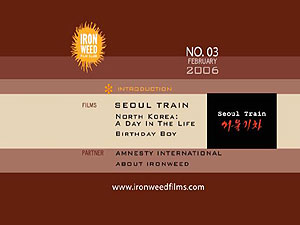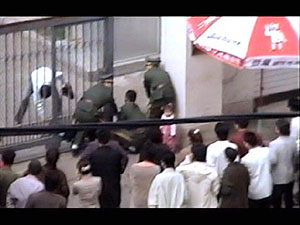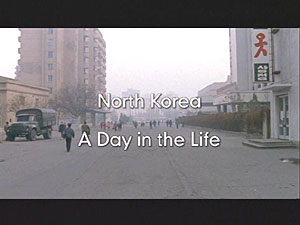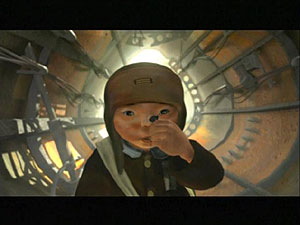| Reviews & Columns |
|
Reviews DVD TV on DVD Blu-ray 4K UHD International DVDs In Theaters Reviews by Studio Video Games Features Collector Series DVDs Easter Egg Database Interviews DVD Talk Radio Feature Articles Columns Anime Talk DVD Savant Horror DVDs The M.O.D. Squad Art House HD Talk Silent DVD
|
DVD Talk Forum |
|
|
| Resources |
|
DVD Price Search Customer Service #'s RCE Info Links |
|
Columns
|
|
|
Ironweed Issue 3 - Seoul Train
A look inside a truly foreign world
 |
Loves: Documentaries
Likes:
Dislikes:
Hates: Human suffering, Egomaniacal dictators
The Story So Far...
Ironweed Film Club offers subscriptions to their monthly DVD, which features two or three films that fit progressive political and social themes, mostly in the documentary genre. The theme changes each month, and the production run is limited, which means you have to jump on a title if you want it, because it won't be available for long.
Ironweed has released two issues so far, and DVDTalk has reviews of both:
• Volume 1
• Volume 2
The Movies
Seoul Train
The most harrowing of the three short films on this DVD, Seoul Train is also the most important, as it shows graphically the effects of North Korea's human rights violations. Too often, unless you can show something visually, it goes unreported. Here's there's more heart-wrenching video than one can imagine, be it about the children of refugees, the attempts to escape or the people trying to help.
 The story is focused on the Underground Railroad that is attempting to smuggle North Koreans out of the country and into freedom. Unfortunately for them, the Chinese government works with North Korea to return refugees to a country that considers what they've done a capital crime. The treatment of these people is unconscionable, and China's role in it is even worse.
The story is focused on the Underground Railroad that is attempting to smuggle North Koreans out of the country and into freedom. Unfortunately for them, the Chinese government works with North Korea to return refugees to a country that considers what they've done a capital crime. The treatment of these people is unconscionable, and China's role in it is even worse.
Though many experts and advocates explain the issue clearly, nothing illustrates the film's point of view like an attempt made at running through the gates of a Japanese embassy. The most horrific of all of the 55 minutes, this segment sees an infant girl thrown to the ground by Chinese secret police trying to stop the refugees. For both sides, this moment visually describes how desperate everyone involved in the struggle is.
The film doesn't exactly have a straight-line progression in displaying its subject matter, taking tangential trips to discuss the Olympics and U.N. politics, but in the end, it would be hard to argue that the film didn't do what it intended to do, which is shed light on a relatively un-discussed human rights disaster. That, and make it easy to care about people you don't know, halfway around the world.
North Korea: A Day in the Life
Created under conditions that render it a state-sanctioned propaganda film, this Dutch film shows a society that struggles through a bitter, government-controlled life, while poisoning the hearts and minds of future generations against America. Combined with an unquestioning loyalty to a Napoleonic totalitarian leader, this situation creates a world that few outside its borders would want to live in. Say what you will about the U.S., but until we are forced to keep photos of Kim Bush Il in our houses, things aren't so bad here.
Yet, the North Korean government let this film's cameras show its country for what it is, which says more about North Korea than anything in the film itself, as only the truly blind would view the scenes in this film and consider them a positive image. Despite that, the government saw clips of children being programmed like robots and factory workers being treated like slaves, and thought, "This should be our public face." Sure, in comparison to the world of Seoul Train, the country in North Korea looks like Club Med, but it's still a depressing place of conformity and social control.
Because of the government restrictions, the filmmakers had to make their points in subtle ways, using various low-key techniques to put focus on certain scenes or moments. Many times the misguided Koreans provide unwitting fodder for scorn, but often a different type of video or music illustrates the dark sides of the best North Korea offers. When a young girl's grandfather rants about the "American dogs," it shows just how the cycle of hate and delusion rolls on, in obvious detail, while shots of a happy Il on a TV set quietly gives the leader a ghoulish feel.
Being able to build your own view of a country, person or ideology is important to understanding, but being able to comprehend how a society views itself is invaluable, and this movie provides that experience. It's also a rare look behind the curtain of secrecy at a people who represent a major threat to world stability. While it's unlikely this knowledge will help in anyway, it's better than being in the dark.
Birthday Boy
This nine-minute animated film from Australia follows Manuk, a small Korean boy playing in a village that has suffered due to the Korean War. Wandering through the husks of downed planes and watching the train come through his village, Manuk is lost in his own world, until a package arrives by messenger. To say much more would be to ruin the impact of this heartfelt and beautiful little film. The animation is gorgeous computer-rendered art that doesn't reach the heights of a Pixar film, but looks quite nice, with well-designed audio that helps carry the mostly wordless piece.
 The DVD
The DVD
Available to subscribers to the Ironweed film club, these films, a combined 112 minutes, are presented together on one DVD, the February 2006 issue. The disc comes packaged in a well-designed ThinPak case with a four-page insert that includes letters from the directors of Seoul Train and the club's president.
The DVD has another classy animated, full-frame main menu with a transition into the submenus, which have options to watch the films, select scenes (for Seoul Train) and check out the special features. The scene-selection menus are text lists of chapters, while there are no audio options, subtitles or closed captioning.
The Quality
Sadly, Ironweed continues to offer their films in full-frame format, though all three are letterboxed. Seoul Train looks like your average DVD documentary, with solid color and detail, though video noise can be obvious at times. North Korea is good up and down, though it looks a bit dull in spots, which might just be the locale. I probably expected more from Birthday Boy due to the style of animation, but it felt a bit soft.
The films were delivered with Dolby Digital 2.0 soundtracks across the board, but only Birthday Boy stood out, thanks to excellent sound design. The two documentaries sounded fine, but nothing about it was particularly impressive. Dialogue was rarely a problem when recorded well, and subtitles were provided when the recording didn't catch everything.
The Extras
The disc starts with a two-part introduction to Seoul Train from Ironweed's president Adam Werbach and Republican Senator Sam Brownback of Kansas. Werbach essentially asks the viewer to listen to Brownback, a man whose politics don't exactly jive with the club's ideals, with an open mind. Brownback then talks about how important the film is. It's very hard to listen to him and not remember who he is, but it's for a good cause.
Unlike the previous issue, the remaining two extras are tied only to the main film, starting with an 3:30 interview with the directors, Jim Butterworth and Lisa Sleeth. They discuss their motivations and the history of their project in the short segment. Then, in a slightly-longer featurette titled "What You Can Do," Butterworth, Sleeth and Brownback talk about what actions people can take in their own lives to help change the situation in North Korea.
 The Bottom Line
The Bottom Line
This third issue of Ironweed is rather powerful, thanks to a very unified theme, and despite being made up of three very different films. For a quick video-based education about this very sheltered country, you could do worse than this DVD. The disc, though similar in quality, isn't nearly as packed as the previous disc, but Ironweed's not exactly about to pack their discs with fluff. This isn't the DVD you'll pick up for a good time, but if your fascinated by world politics and the depths of the human soul, it's worth checking out.
Francis Rizzo III is a native Long Islander, where he works in academia. In his spare time, he enjoys watching hockey, writing and spending time with his wife, daughter and puppy.Follow him on Twitter
*The Reviewer's Bias section is an attempt to help readers use the review to its best effect. By knowing where the reviewer's biases lie on the film's subject matter, one can read the review with the right mindset.
|
| Popular Reviews |
| Sponsored Links |
|
|
| Sponsored Links |
|
|
| Release List | Reviews | Shop | Newsletter | Forum | DVD Giveaways | Blu-Ray | Advertise |
|
Copyright 2024 DVDTalk.com All Rights Reserved. Legal Info, Privacy Policy, Terms of Use,
Manage Preferences,
Your Privacy Choices | |||||||













